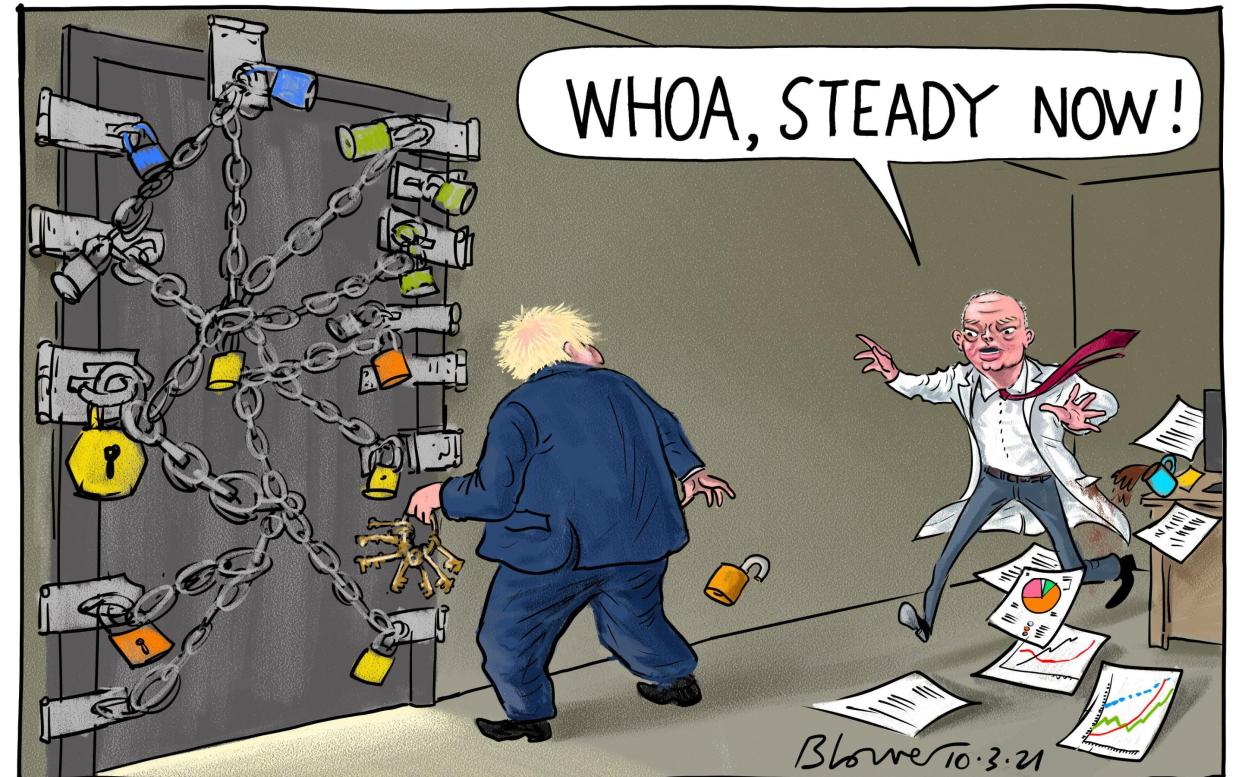Lockdown exit cannot be speeded up even if the data is good, say Chris Whitty

- Oops!Something went wrong.Please try again later.
It is “very unlikely” that lockdown exit will be speeded up, even if data on Covid cases keeps being better than was forecast, the country’s chief medical officer has said.
Prof Chris Whitty said he would "strongly advise" against any move to shorten the timetable for easing lockdown restrictions.
“If you open up too fast, a lot more people die,” Prof Whitty told MPs.
He told the science and technology committee that “things can turn bad very fast” as chief scientific adviser Sir Patrick Vallance said moving faster than the current schedules would mean “flying blind” without seeing the impact of changes.
More than 22 million people have now had their first vaccine, and daily cases and deaths are the lowest for five months.
Real world data has shown both the Pfizer and Astra Zeneca jabs are more protective against hospitalisations than had been modelled, preventing around 80 per cent of hospitalisations in those aged 80 and over.
But Prof Whitty and Sir Patrick said they thought there was little chance that the current timetable for easing lockdown would be improved on.
Prof Whitty told the Commons scientific and technology committee: “It’s pretty doubtful that we will be in a position where we can say the data look so fantastically better, please take more risks here. I think that seems a very unlikely situation.”
The current strategy allows a five-week interval between significant unlocking steps, meaning that shops are not due to reopen until five weeks after schools went back.
Prof Whitty told MPs he would "strongly advise" against any attempt to "concertina" the five-week interval between steps, saying the opening of shops and outdoor hospitality on April 12 represents "a very big block" of measures.
And he said some “very significant risks” could accumulate from May 17 - when pubs and restaurants open fully.
Prof Whitty said that although older and vulnerable people would mostly be protected by vaccines, younger people will not all be vaccinated by April, and they mostly drive transmission of the virus.
And he said time was needed to assess the impact of changes on the virus, saying other countries had moved too fast to ease lockdown.
He told MPs: "If you look at the history of this all around the world, the history of this is not full of countries and individual leaders wishing they had done more, faster.
"It's full of leaders who wished they had acted quicker and then been more careful as they take things off."
The Government's chief scientific adviser Sir Patrick Vallance echoed that view, telling MPs: "If you truncate that, you are essentially flying blind.
"You might feel 'oh, I can smell it going in a certain direction, it looks like this', but you really want to know.
Professor Chris Whitty told MPs the situation could "turn bad" very quickly if a close eye is not kept on it.
He told MPs: "I think a lot of people may think that this is all over.
"I would encourage them to look at what is happening in continental Europe at the moment where a lot of countries are going back into rates going up and having to close things down again having not been in that situation before.
"I think it's very easy to forget quite how quickly things can turn bad if you don't keep a very very close eye on it."
The chief medical officer also pointed out that by 8 March last year, the UK had seen just two deaths, yet was in a “very difficult situation” soon after with lockdown on March 23.
He added: "If you're thinking about a surge in transmission remember that the great majority of those who will drive a surge in transmission are not yet vaccinated and will not be vaccinated by Easter.
"So, I think the idea that that is the sort of get-out-of-jail card in terms of a surge of transmission, I think, is to misremember where in the age spectrum the drive of transmission is, and it's in younger adults, not in those who have so far been vaccinated, by and large."
Modelling considered by the Scientific Advisory Group for Emergencies (Sage) has suggested that even under the most optimistic set of assumptions, at least a further 30,000 Covid-19 deaths could occur.
Such numbers were “perfectly realistic” he suggested, with “all the modelling” suggesting cases will spike at some point after restrictions are eased.
He said: “What we are going to see is as things are opening up, what all the modelling suggests is that at some point we will get a surge in virus.”
“Whether that happens, we hope it doesn't happen soon, but it might for example later in the summer if we open up gradually, or if there is a seasonal effect, it might happen over the next autumn and winter.”
“But all the modelling suggests there will be a further surge and that will find the people who either have not been vaccinated, or the vaccine has not worked.
“Some of them will end up in hospital, and sadly some of them will die. And that's just the reality of where we are with the current vaccination.”
“If you open up too fast a lot more people die. A lot more people die,” he said.

